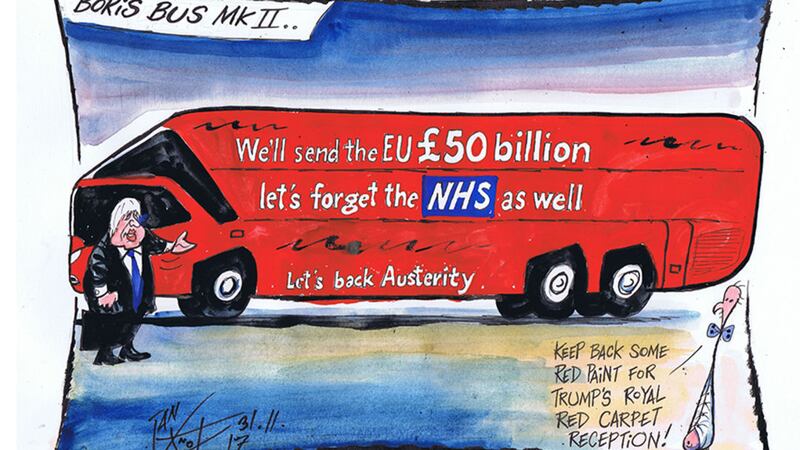No border down the Irish Sea, says Arlene and Theresa. No border in Ireland, says Leo and Simon. No border in a field in Monaghan, says Michel Barnier. It will have to be paid for by the Irish government, says Kate Hoey. No chance of a hard or soft border, no matter who wants it, says I.
Battle has commenced. There is no need to rehearse the significance of the issue. Every politician and commentator of any stature has come to the Brexit table and belatedly realised that the Irish border is central.
This is the most important moment in Irish history since 1920 when the Irish border was first designed. It is such a significant moment that it is only distracting to get caught up in the individual outbursts that accompany such moments. However, it is impossible not to notice Arlene Foster’s advice to Irish government ministers and The Sun’s admonition to the taoiseach to ‘shut your gob’.
Arlene has lived and worked on the border all her life and yet she allowed her party to support Brexit. A border politician should have known that Brexit would resurrect every fear, every hurt and every division that the border has generated for over 90 years. The only reply The Sun deserves is the Liverpool one – don’t buy it. But just to say that this is the time for talk, for serious people to speak seriously to each other.
The difficulty with Brexit is that there is no solution. Or to be more accurate, there is no solution as it is presently defined and discussed. It is like packing a case with too much stuff. Every time you push down on it to lock the case there is something sticking out. Solve the English Brexit and you are left with Scotland and Ireland sticking out. Solve the Irish Brexit and Scotland is left sticking out. The only solution is to buy a bigger case.
The bigger case here is all the relationships on these islands and the totality of those relationships with Europe. We are intermingled physically, socially, historically and culturally and yet so often we behave as if we lived on the far side of the world from each other. Ireland wasn’t on the Brexiteers' radar and the British media only awoke to the border problem a week or so ago. Few in Ireland are tuned in to the Scottish situation and the problems they are left with if there is some special arrangement for Ireland.
The natural and understandable instinct is to fight your own corner and let the future look after itself. Thankfully, that is not so simple in this case. If the Brexiteers crash out of Europe or get a mediocre deal, which is the only thing possible, they are going to create a large unsettled group who will become even more committed to their cause. That will happen in England, Scotland or Ireland. The percentage voter gaps between the Leavers and the Brexiteers, between the Scottish independents and the Scottish unionists, between Irish nationalists and Irish unionists are so narrow that each country and each cause will have a very strong cohort of very angry and disgruntled people which will make governing very difficult.
Of course, the Tories may fall apart and Labour may come to power, adopting an evolving policy of staying within the customs union and the single market. They may even gradually convince England that a new but very close relationship with Europe may be best for everyone. That would alleviate the present tensions and allow everyone to settle back into a less hysterical mood.
To continue the metaphor, that would appear to put everything back into the case with nothing sticking out. But it wouldn’t disguise the reality that the case itself is no longer fit for purpose. It is damaged beyond repair. The patch up job of devolution was a worthy effort at giving it a better sheen and prolonging its usefulness. But the impact of Brexit was just too much. The tear that it inflicted is so severe that a new case or new cases are required.
It is clear that we are not far enough into the arguments and we haven’t reached the point where politicians are forced to see beyond their own interest. But remember, that was the case one time in Europe until they had fought each other to a standstill and serious politicians began talking to each other until 26 countries managed to live in reasonable harmony.









